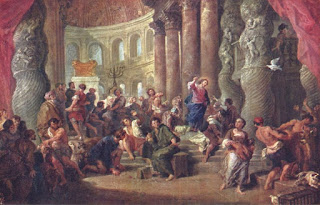Read Barth and Get Over Yourself
Like many of you, dear readers, I grew up within a strand of North American evangelicalism which, at its best, fosters a deep piety and a robust affirmation of personal religious experience.
I remain profoundly grateful for this formation. Still, on the down side, this faith tradition can slip into some worrisome solipsistic tendencies. Fortunately, these proclivities are often transcended in real communities, in great acts of solidarity and sacrifice. (For example, a friend who has spent time recently volunteering to help flood victims in the Baton Rouge area attests to the herculean disaster relief efforts led by Southern Baptists there).
Nonetheless, individualist ideologies suffuse the air we breathe, not only as evangelical or liberal Christians but as North Americans in general, in this decadent age of late-modern consumerist society. Of course, rants about religious individualism are so commonplace as to be banal. My point here is that American individualism, creates some of the major stumbling blocks for new (and even not so new) readers of Karl Barth. Reading Barth well is bloody hard enough, but I'm convinced an individualist hermeneutic fosters distorted readings of the great Swiss theologian, such that it becomes easy to miss the political character of his doctrines of election and reconciliation as well as the crimson thread of social radicalism that (I'm convinced) runs through his corpus from beginning to end.
The situation, arguably, is so bad that one fellow recently quipped on Twitter (and I paraphrase): "Gee, you don't hear that much from Barthians about social justice. It's refreshing." This comment followed on the heels of Travis McMaken's recent podcast with Trip Fuller on "Five Reasons to Go Barthian" wherein McMaken highlights the red pastor of Safenwil's lifelong commitments to democratic socialism.
I hope the tweeter was talking more about popular pieces on Barth and not scholarly work. Nonetheless, shame on us! Let's try to rectify that situation, shall we? Whatever your own take on issues of community and society might be, you will not read Barth well unless you come to terms with his commitments in these areas.
In the introduction to his superb Barth anthology, Clifford Green homes in on the problem beautifully:
(By the way, for anyone who is a novice to reading Barth -- and most of us are -- Green's essay is an excellent point of entry.)
Whatever episode from Barth's life or theme of his writings you might be examining, you will struggle to get the main point if you fail to grapple with this anti-individualism in Barth. And that principle applies not only, say, to his anti-Nazi activism and his diffidence toward Western anti-Communism, but also to his accounts of the Trinity, Chalcedon and the fall.
Barth was as political theologian to the bone, obsessed with community. What about you?
==================================
Follow @jsjackson15
 |
| Jesus vertreibt die Händler aus dem Tempelby Giovanni Paolo Pannini via Wikimedia Commons (PD-US) |
Nonetheless, individualist ideologies suffuse the air we breathe, not only as evangelical or liberal Christians but as North Americans in general, in this decadent age of late-modern consumerist society. Of course, rants about religious individualism are so commonplace as to be banal. My point here is that American individualism, creates some of the major stumbling blocks for new (and even not so new) readers of Karl Barth. Reading Barth well is bloody hard enough, but I'm convinced an individualist hermeneutic fosters distorted readings of the great Swiss theologian, such that it becomes easy to miss the political character of his doctrines of election and reconciliation as well as the crimson thread of social radicalism that (I'm convinced) runs through his corpus from beginning to end.
The situation, arguably, is so bad that one fellow recently quipped on Twitter (and I paraphrase): "Gee, you don't hear that much from Barthians about social justice. It's refreshing." This comment followed on the heels of Travis McMaken's recent podcast with Trip Fuller on "Five Reasons to Go Barthian" wherein McMaken highlights the red pastor of Safenwil's lifelong commitments to democratic socialism.
I hope the tweeter was talking more about popular pieces on Barth and not scholarly work. Nonetheless, shame on us! Let's try to rectify that situation, shall we? Whatever your own take on issues of community and society might be, you will not read Barth well unless you come to terms with his commitments in these areas.
In the introduction to his superb Barth anthology, Clifford Green homes in on the problem beautifully:
It is common to read Barth as the theologian who re-asserted the transcendence and primacy of God over against liberal, anthropocentric theology. But this is at best a problematic half-truth. Barth's protest was not only against anthropo-centric theology, it was equally against its subjectivism and individualism. In other words, anthropocentrism and privatism are for Barth two sides of the one problem. Positively stated, Barth was as much concerned to develop a social and public theology as a theocentric (christocentric and trinitarian!) theologian. From first to last his was a communal theology, and the relation of theology and politics was always intimate in his thinking (Karl Barth: Theologian of Freedom, Fortress, 1991, p. 18).
(By the way, for anyone who is a novice to reading Barth -- and most of us are -- Green's essay is an excellent point of entry.)
Whatever episode from Barth's life or theme of his writings you might be examining, you will struggle to get the main point if you fail to grapple with this anti-individualism in Barth. And that principle applies not only, say, to his anti-Nazi activism and his diffidence toward Western anti-Communism, but also to his accounts of the Trinity, Chalcedon and the fall.
Barth was as political theologian to the bone, obsessed with community. What about you?
==================================
Follow @jsjackson15

Comments
Brenton